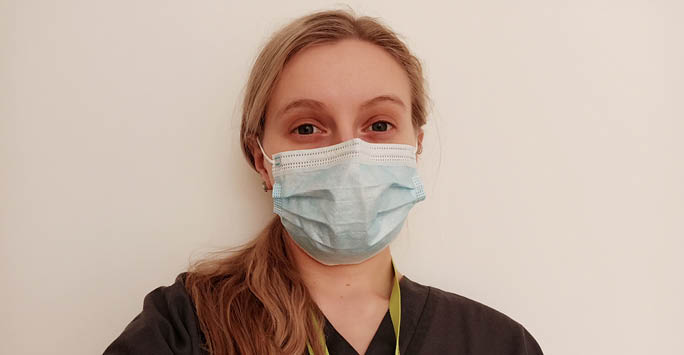
Student Doctor Victoria Simpson was completing an intercalated master’s degree at Liverpool School of Tropical Medicine (LSTM) when the first wave of the COVID-19 pandemic hit, cancelling her research trip to Malawi and sending her on a completely different path – one with unexpected benefits and rewards.
“With my overseas research project out the window, I continued my dissertation remotely using existing data and was looking around for ways I could be useful in the fight against COVID.” says Victoria, now in her final year of the MBChB programme.
“I received an email about a project that was looking for volunteer phlebotomists to take part. The project transpired to be the COVID-LIV Virology study, one of the first cohort studies to look into COVID transmission in the UK.”
The study, carried out by the University of Liverpool’s Institute of Infection and Global Health, follows households over a 12-week period to measure how the virus spreads and how immunity develops.
Victoria joined the research team as the only student doctor and worked alongside academics, LSTM nurses and University researchers who had had their usual research studies put on hold due to the pandemic.
“I spent many days over the summer as a data collector, which in practice meant visiting hundreds of households to collect baseline blood samples and nose and throat swabs from those who had signed up to take part in the study." We were looking into how the virus spreads within households and what factors play a part in its transmission.
“It was a bit of a surreal one as suddenly I found myself paired up with another researcher, usually an LSTM nurse, and travelling round in a taxi, getting our PPE on in front of people’s homes with the neighbours twitching the curtains seeing what on earth was going on.”
"The hardest part was refusing the many cups of tea that were offered as soon as we stepped foot in the door, no matter how much I would have liked one!"
Victoria loved the chance to get a lot of hands-on phlebotomy experience and be part of a cohort research study, all of which proved particularly useful when it came to applying for foundation training opportunities, especially once she set her sights on an academic foundation programme.
“I met a lot of academic doctors involved in the study and they really helped me prepare for interviews. There was also lots of examples I could use in the interviews themselves around being part of a team and providing input.”
“It opened my eyes to the fact that a lot of the time as student doctors we connect research with producing papers."
Whether my name will end up on a paper or not for this study, the experience I gained proved invaluable in securing an academic foundation role.
"Plus, I made lots of contacts at the Royal Liverpool University Hospital who I hope to be able to continue to work with over the next 2 years.”
Looking back now, Victoria wouldn’t change a thing about how events unfolded and encourages other students to seek out ways to get involved in research.
“While some research opportunities may not be as glamorous as an overseas trip, they can be more fulfilling than expected, not to mention right on your doorstep! The study delivered on all of the experience I was hoping to gain, getting me from A to B and helping me achieve my goal of an academic foundation.
“It also did wonders for my self-confidence. Often, I was the most medical person in the room." It was a chance for me to try on that role for size and think, actually I feel all right doing this.
I know that so many of our plans have been shifted with the pandemic but, the way I see it, in one way or another, we’re exactly where we are supposed to be.
However, Victoria still hopes to get to Malawi someday.
Discover more
What is intercalation? A significant opportunity for self-development and an investment in your future career, intercalation offer you the chance to earn an additional degree by studying a year-long intercalated course during your time at University. Learn more on our intercalation web pages.